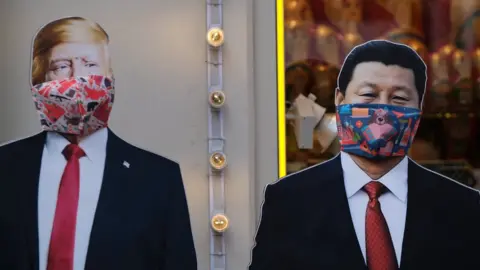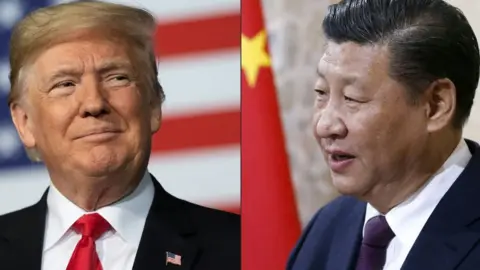Coronavirus: Which countries does US think handled it best?
 Reuters
ReutersAmericans have praise for South Korea and Germany's handling of the coronavirus pandemic but give poor marks to Italy and China.
What other attitudes do Americans hold when it comes to the global response to the outbreak?
The Washington-based Pew Research Center, a public opinion polling and research organisation, took the temperature on how Americans think other countries have handled the pandemic.
Pew surveyed 10,957 US adults from 29 April to 5 May for the poll.
Here are some key takeaways.
1 - Praise for South Korea, criticism for China
When it comes to the response to the global coronavirus pandemic, a majority of Americans give high marks to South Korea and Germany - in fact higher marks than they gave their own country.
A majority of respondents gave both those countries a rating of either "good" or "excellent" for their efforts. Just under 50% of respondents said the same about the US response.
South Korea's rapid ability to react to the virus spread and to set up a testing network has made the country a role model as other nations look to battle their own coronavirus outbreaks - though officials have had to respond to recent outbreaks linked to nightclubs and bars.
Germany has also won praise for its response to the outbreak.

Mass testing and effective lockdown restrictions have helped keep the death toll far lower than in other European countries, though infection rates have increased since its lockdown measures were eased.
Americans placed the UK in the middle of the pack, roughly divided over its response.
In contrast, a majority of Americans say China and Italy have not handled the outbreak well.
In March, Italy was the worst-hit country by the pandemic after China. The US, which now has over 1.5 million known cases, overtook Italy's death toll in mid-April.
An overwhelming majority of Americans say the US can learn from other countries about ways to slow the spread of the virus.
"The American public is paying attention to how countries around the world are dealing with [the outbreak]," Richard Wike, Pew's director of global attitudes research, told the BBC.
2 - Partisan divide over WHO
The World Health Organization (WHO) "is an organisation that probably wasn't on the radar for most Americans a few weeks ago", says Mr Wike.
Now, Pew research indicates a sharp divide when it comes to the American public's attitudes towards it.
WHO drew strong partisan reactions from respondents, with 62% of Democrats believing the agency has done either an excellent or good job of dealing with the pandemic - with just 28% of Republicans agreeing.
There was also a divide when it came to trusting information on the virus coming from the WHO.
About one-third of Republicans said they trusted WHO information versus 80% of Democrats.
That division was even more stark when researchers polled liberal Democrats and conservative Republicans.

Of those more left-leaning Democrats, 86% indicated they trusted the WHO. That fell sharply to 27% among more conservative Republicans.
US President Donald Trump is not the WHO's only critic - other countries have raised questions about the agency's handling of the pandemic - but he has been the most vocal.
This week he accused the agency of having "consistently ignored credible reports of the virus spreading in Wuhan in early December 2019 or even earlier" and of failing "to adequately obtain, vet and share information in a timely and transparent fashion".
He has also halted funding to WHO, which he has labelled a "puppet of China".
WHO chief Tedros Adhanom Ghebreyesus has defended the agency's response. He has agreed to an independent evaluation, which would look at what lessons could be learned and put forward any recommendation.
Beijing has also defended its actions during the outbreak, saying the country has acted with openness and transparency.
3 - Coronavirus deepens China distrust
The pandemic has worsened relations between Donald Trump's America and Xi Jinping's China.
The President has repeatedly chosen to call the coronavirus the "Chinese virus", a term that has caused offense in Beijing.
Mr Wike says negative views towards China among the American public are the highest since Pew began asking the question in 2005.
He notes there has been a consistent partisan divide over the issue but that the numbers have been steadily trending towards unfavourable among both Democrat and Republican voters over the past few years.
Americans have long had concerns about China in matters like trade and jobs, he says, and more recently on matters like cyber security and human rights.
 AFP via Getty Images
AFP via Getty Images"The mix of issues [of concern] has gotten more diversified," he says. "Now coronavirus is part of the mix as well."
Currently, 66% of Americans hold an unfavourable view of China.
They are also distrustful of information coming from Chinese officials on the virus, with 84% of respondents saying they place "not too much or no trust" in Beijing's claims.
And they are sceptical of China's handling of the virus, with 64% ranking the response as fair or poor.
Those numbers skew slightly higher among Republicans and older Americans, who are more likely to say China has not handled the crisis well.
4 - Americans divided over US response
Americans aren't just watching the foreign response to the contagion, the survey indicates. They are also weighing how their own country is handling the challenge.
Just over half - 52% - are critical of the US response. In comparison, 47% say the US has done either an excellent or a good job in dealing with the outbreak.
Respondents were not asked whether they reserved their criticism the federal or state government. They were surveyed on how good of a job the US has done in dealing with the coronavirus outbreak.
In the US, it's up to states to maintain public order and safety and it has been state governors who have issued lockdown or shelter-in-place orders - and who have since eased restrictions to varying degrees.
The federal government has coordinated the overall response, dealing with matters like fiscal aid packages, testing, and equipment.
A number of states have seen protests against the lockdown orders aimed at limiting the spread of Covid-19.
